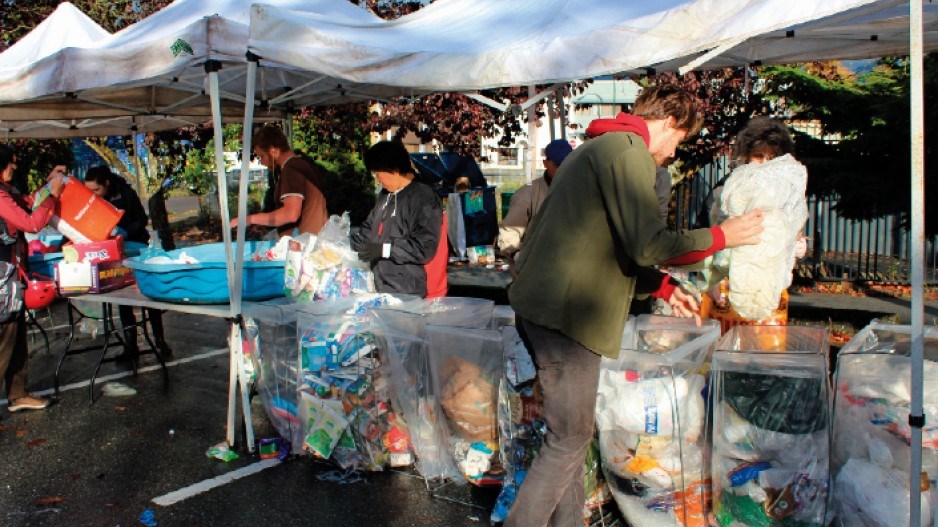By volume, polystyrene, or Styrofoam, as it is better known, is 5% product and 95% air, making it the bane of most landfill operators. It takes up much space – comprising 10% to 30% of landfill sites – but yields little revenue when a load arrives at the weigh scale. It also is produced with benzene, a nasty carcinogen that has prompted 20 major U.S. cities to ban its use in food containers.
So it’s no surprise that the City of Burnaby jumped at a chance to work with an entrepreneur who offered an economical and efficient way to dispose of the product. Last month, the city launched a year-long $30,000 pilot project to accept Styrofoam from residents and local businesses at its Still Creek Avenue depot seven days a week.
“Several Burnaby residents have spoken to us about [recycling] Styrofoam,” said Dipak Dattani, the city’s assistant director of engineering and environmental protection. The opportunity to take action came when the city met with Mark Obedzinski, whose firm NJM Foam Only Recycling Inc. has been building a major enterprise collecting and “densifying” the product and selling it.
Burnaby accepts EPS from Burnaby residents for free but charges local businesses a nominal $6 a cubic yard.
Saving the world
Obedzinski’s own experience getting into the business typifies the slow but growing realization of polystyrene’s impact on the environment.
Two years ago, after a spirited conversation over a beer with a friend about saving the world, Obedzinski began talking to landfill operators, offering to take asphalt shingles off their hands. They said forget about shingles, which are a revenue producer and useful for holding down other garbage. Their biggest headache was polystyrene, which fetched little money but took up an inordinate amount of landfill area.
“No one feels good about tossing Styrofoam into the garbage, but recycling it is about volume; it must be cost-efficient and economically viable for producers and waste haulers to participate in a recycling program,” said Obedzinski.
After researching the subject for a year, the special effects expert for the film industry jumped in with a $50,000 line of credit and rented 4,000 square feet of warehouse space in Coquitlam. He installed hydraulic machinery that compresses polystyrene into 30-kilogram ingots that manufacturers buy and use in making everything from paving stones to picture frames. Business has been so good, he rented another 5,000 square feet in December and plans to expand his compression machinery and receiving areas.
BFI strategic partner
Obedzinski recognized early the need for strategic partnerships to deliver a sufficient volume to make his business viable. He found BFI Canada, a major Canadian waste company, which was able to provide contracts for high enough volumes for pickup.
“It was a win-win situation because we got the volume and BFI were able to deliver a new service to their clients,” said Obedzinski. Another source that has proven profitable is the $1 billion construction of the new Port Mann Bridge and the accompanying maze of highway ramps. Instead of sand, which would quickly be absorbed into the boggy riverside land, the builders use large polystyrene forms as fill.
Jose Simas and Zeb Pereira were focused on growing their Pacific Mobile Depots business of picking up recyclable materials throughout southern Vancouver Island and Metro Vancouver when they first considered polystyrene seven years ago.
Former employees of the Capital Regional District, the two men went into business for themselves after the district laid off its recycling staff in 1999 and invited the private sector to provide a solution. After five years of developing a solid business on other recyclables, they decided to add polystyrene to the list of materials they pick up, charging a nominal $6 a bag.
Dennis Ranahan, deputy manager of the solid waste department at Metro Vancouver, says the regional government is encouraged by programs like the one Burnaby has launched. However, he predicts the biggest changes for polystyrene will come when the substance becomes subject to the extended producer responsibility program in a couple of years.
The federal government’s product-stewardship program is designed to shift the responsibility for collecting, processing and recycling materials away from municipalities and direct financial cost and management to those who design, produce, sell or use these materials.
Meanwhile, Simas says he has seen a dramatic increase from manufacturers and others seeking sources of recycled polystyrene.
“It took a while; we didn’t know to the extent that people wanted it,’’ said Simas. “Now there are so many people coming into the picture. They email us and phone us, saying they are looking for the material and can we talk with them.”




